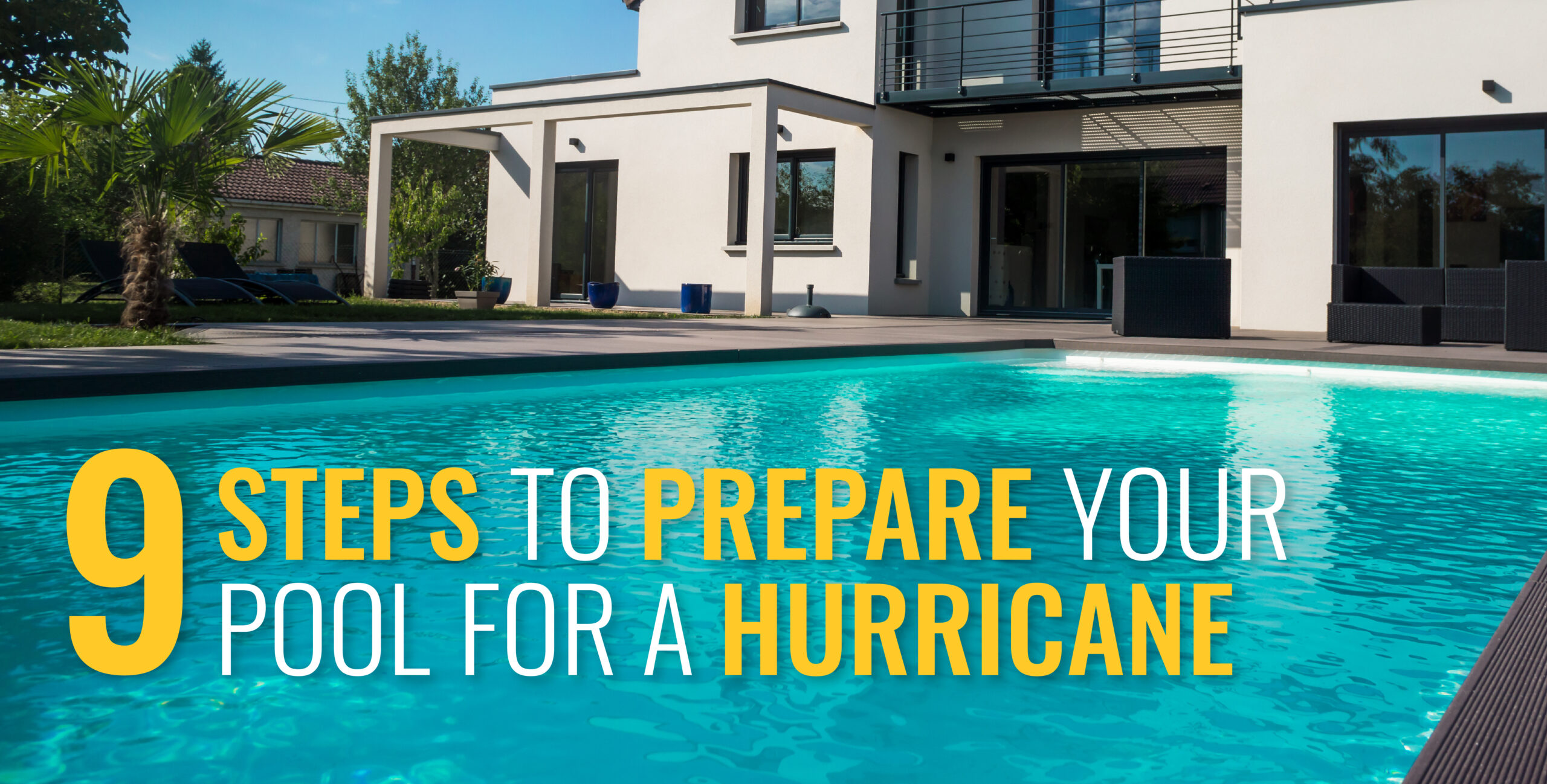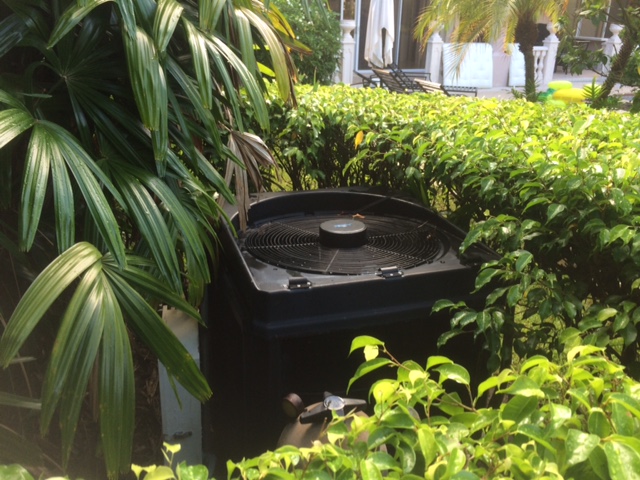As hurricane season approaches, it's crucial to ensure the safety of your property, including your…

Does a Swimming Pool Heat Pump Work in Cold Weather?
Whether you live in the north east or in another country with cold winter seasons you may wonder if a swimming pool heat pump would be a good investment for you. In this article, we will explain how a heat pump works in cold weather and how it can help you extend your swimming season.
Most heat pumps shut down when the outside temperatures go down below 55° degrees, some can continue to operate down to the mid to low 40s, and some can operate in temperatures of mid to low 20s. These types of heat pumps have different names and are made by various manufacturers they can be referred to as reversible heat pumps, heat/cool heat pumps or icebreakers.
In colder temperatures a heat pump works in the same way as in warmer temperature. A heat pump utilizes natures free heat to transfer what heat is in the air through the evaporator coil. On colder temperature days, a heat pump will begin to freeze the condensate that forms normally on the evaporator coil. Standard heat pumps simply turn off at this point to avoid mechanical damage to the heat pump system due to this icing condition. A Hot Gas Defrost unit, like AquaCals IceBreaker model, will utilize a reverse cycle process which reverses the flow of refrigerant gas through the unit, quickly defrosting the evaporator coil- which allows the heat pump to continue to heat. (See drawing below)
Heat Pump Normal Operation


We at AquaCal recommend keeping the following as a rule of thumb when it comes to heat pumps in the winter anytime the average temperature (high and low) is 55°F or higher, your heat pump will work to your expectations. It is important to remember that only a Hot Gas Defrost Unit will automatically reverse, enabling operation at below freezing temperatures.
Please remember, if not using your swimming pool during the winter time, or once your swimming pool season has come to an end, it is extremely important to follow proper procedure for winterizing your swimming pool heat pump. For instructions on how to do this please click here.
Please feel free to ask us any questions you may have or leave any feedback, we would be happy to help!




Hi there,
Rass Mandal is a retreat and vacation rental residence with a uniquely shaped pool of approximately 45,000 gallons. It’s hard to size which the photos on the website show.
During the past 11 years, I have had 3 pentair 140,000 BTU propane heaters that all eventually failed. I now have a Rheem propane 140,000 BTU heater that I’ve been operating for 4 years. During that time I have replaced the heat exchanger eight times ($1200/time) as the pool chemicals seem to appraise the metal although I obsessively maintain the PH at 7.6 – 7.7.
I am now considering a pool heat pump. It’s actually the first I have heard about them.
I hope to keep the pool temperature at 80 – 82F degrees from May 1st to October 1st.
Rass Mandal is in Santa Fe, New Mexico.
http://www.rassmanda1.com
Thank you,
Richard
Hi Richard,
We have a sizing program on our website that can determine which heat pump, and how many, would be needed for your pool. Based on the information you have provided, 2 – SQ225’s would probably handle this pool. If you would like to speak with us about the sizing, please call us at 727-823-5642.
Mark
AquaCal Tech Support
If night time temperatures temporarily are down to about 42 F will pool circulation pump freeze and should it be left on to circulate water?
Dave
Hi Dave,
Water will freeze as the air temperature approaches 32 F. Anytime the air temp is below 40 F, you might want to keep the circulation pump running to prevent freezing.
Thanks,
AquaCal Tech Support.
Since the heat pump draws from free heat from the air, can my pool water temperature get above 75 degrees if the outside temperature is only 70 degrees/
Good Afternoon Anthony,
Hope you are doing well. If the heat pump has been sized appropriately for the pool, then you can usually raise the water temp 30’F above the air temp.
You should be able to get the the pool to a comfortable temp of 82-85 degrees with enough run time. Several variables can come into play such as coastal winds
or water features that can slow down heating but you should still be able to reach temp. Please feel free to call us at 727-823-5642 with any questions.
Thanks,
Robert Brown
AquaCal Tech Support
We live in Toronto, Canada and have both a 50k btu heat pump and solar heating for a small 7000 gallon pool. We run the pool from May1-Oct 1 and I have been varying the heat pump target temp with the month. I know a cover would be best but it isn’t going to happen for a variety of reasons. I prefer 75 for the water but 80 is a big request from our grandkids. I run the water pump 24/7 ( variable speed and at low speed so the cost is tiny. The issue is the heat pump. The type we have will work in principle down to 32. It has a timer on it so I was wondering if it would be best to run it from say 6AM to 9PM? The worry is that on cooler nights won’t a heat pump actually cool off the pool?
Thanks…
I live in central California, where it is very hot in the summer and dry, In the winter it does get semi cold 30 to 40 degrees and dry again. Ive read heat pumps do not work well in dry areas. Will the Icebreaker work well in dry climates?
Hello Robert,
For heating, you want to run heat pumps during the day when ambient air temps are highest. It’s also a good idea to cover the pool at night with an insulating blanket or liquid blanket to reduce heat loss.
I have a question having read the thread. I live in Tampa Florida would I be correct in that during the winter months it would be more efficient to run the pool system during the daylight hours where I have a better chance of 55 degree and above temperatures
This doesn’t state minimum and maximum temperature ranges, but implies that its dependent on the outside ambient temperature (and presumably the pool volume). It also states that it defaults to 27oC
I think you need to remonstrate with calculations that this is insufficient to reach the requested temperature of 29-30 oC, based on the average seasonal temperatures and pool volume.
Hello. I am shopping for a pool heater or heat pump. I have a semi in ground pool with insulated walls. I live in northern Illinois, where it's quite cold right now and need something that will allow me to use my pool more often. From what I understand, heat pumps take the heat from the air. How does that benefit me when it's 45-55 degrees out? Will a heat pump still work? How does hook up work? Is an electrical connection all that's needed?
Good morning Ben-
For standard heat pump pool heaters, the low end of operation is in the 40 to 50°F range depending on product design.
So your conditions are marginal for an HPPH. The restrictions that come into play at these temps are twofold.
The first being reduced output. Since the units do get their heat from the air, as the air temperature falls, so too does the heat output of the HPPH. If one takes that into account and sizes for the lower output, the pool can be heated.
The second consideration, again for standard HPPH units, is low temperature cut off. Somewhere around that low 40°F range the heater will simply stop operating and enter a “passive defrost” mode. No operation….no heat into the pool.
So, if you take these issues into account, one could be happy with a HPPH system.
There are also available HPPH units with an “active defrost” system that manages that low temperature operation and allows the unit to continue to operate into the low 30’s. The unit still loses output as the air temp falls but it does continue to produce heat below the 40°F point. Again, sizing compensation can result in enough heat to handle the pool.
Hook up is fairly straight forward. Water line in…water line out and have “Sparky” the electrician connect the proper power supply per the model of heater selected.
I hope you find this helpful, please do not hesitate to reach out to us should you have any further questions.
I live in maricopa Arizona and would like to know if the aquacal icebreaker heat wave would work for my pool in the winter months at a temperature of 84-85. Nov. Dec. Jan. Feb.
Good morning –
Properly sized, Aqua Cal should have a heater that will meet your needs. Our free computerized audit will complete the sizing and cost of operation data needed. You can find it on the top of this page.
Thank you!
Hi! I am a member of a heated pool called PIVONIA in FORTIS HOSPITAL GURGAON. I would like to know what should be the temperature of the pool in winters. The length of the pool is 20mts approx.
we have 3 heat cool pumps in our swimming pool but its not maintaining the temperature if we started three pumps at a time it will be reaching maximum temp 23 only. Our set temperature is 30. how I can get the temperature until 27 or 28 ? our swimming pool length is 24 mtr width 6 mtr height 1.7 starting side 60 cm. Each heat cool pump capacity is 7.5Kw.
Thanks.
Ajesh
Good day, We would be happy to help you with this but need more information-
Where is the pool(2) does it have a blanket (3) how long are they running there pool each day. (4) 50 or 60 cycle, as soon as you can provide that to us we will be happy to help!
We have had a aquacal icebreaker on our pool in Western New York since 2003 and absolutely love it. We were told that we could heat the pool if we cover out as early as mid April and into the first snow fall! We keep our 17×34 in-ground vinyl liner pool 86 degrees from April 15 thru October 30th each season! I would recommend this to anyone!
By the way we used to use natural gas to heat our pool and for only a few weekends throughout the summer and swim season! Now we swim all summer and early spring and fall for the same cost!
Bob & Christine B.
Thank you so much for your comment, we are happy to hear you are enjoying your heat pump!